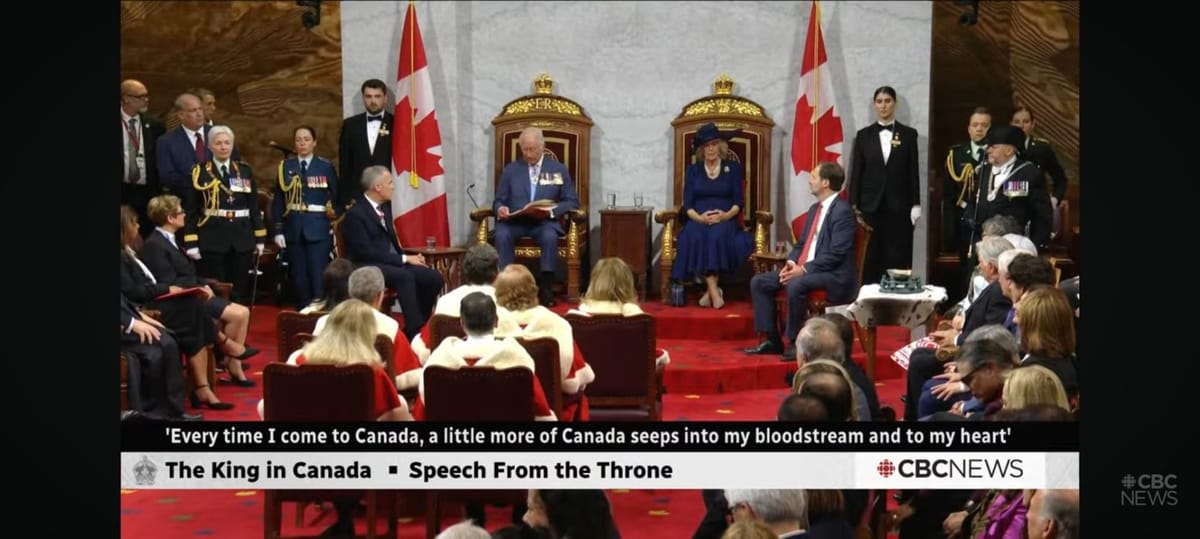Still Crowned: How the Heck Does Canada Still Have a King?

Have you ever watched a swearing-in ceremony for Canada's new ministers?
I did so you don't have to and one detail stood out, the pledge of allegiance.
It’s pretty wild that in 2025, ministers are still made to say a solemn pledge to be:
"a true and faithful servent to His Majesty King Charles the Third, his heirs and successors."
This is still happening today, in a modern democracy. In a country that prides itself on being independent, progressive, and self-governing.
We are still asking ministers to pledge fealty not to the people, not even to the Charter or Rights and Freedoms or our Constitution but to a literal king. The guy who wears jewels stolen from colonized nations and sits atop an institution built on centuries of slavery, imperialism, and violent dispossession.

Let’s be clear: this isn’t just ceremonial fluff.
Canada may pretend to be a modern democracy with a decorative crown, but the reality is more twisted.
We are a monarchy pretending not to be one. The consequences of that show up in subtle and not-so-subtle ways.
As I write this, today, King Charles III is delivering the Speech from the Throne.
This marks the first time in 48 years that a reigning monarch has done so in Canada, and only the third time ever.
Queen Elizabeth II read the speech in 1957 and again in 1977, both during symbolic royal tours.
But this one hits differently.
It is not just a visit. It is a reminder.
A symbolic move, sure but symbols matter.
And in the context of a rising authoritarian wave south of the border, the timing feels more than ironic.
Because while the Republican Party in the U.S. has rallied behind a man who believes he is a king and has threatened the sovereignty of our country. The King was asked to read the speach from the throne as a recognition of our sovereignty. Which strikes me as bizarre. Here we are in Canada, still having our ministers swear loyalty to a royal family.
It is cosplay constitutionalism.
(And I say that with respect to cosplay.)
The weirdness goes deeper.
People who oppose monarchy are often labeled republicans, as if rejecting hereditary power aligns them with the authoritarian brand now controlling the U.S. Republican Party.
We need a better word.
Because the answer to one totalitarian regime is not to run back to the mothership of imperial institutions and a deeply corrupt family.

Now, you might be saying:
"Ben, come on. The monarchy doesn't really have power in Canada."
But it does.
Not in the daily business of government but in moments of crisis, the Crown's representatives our Governor General and the Lieutenant Governors hold real reserve powers.
They’ve exercised them before.
They will again.
Remember 2017?
Christy Clark, then Premier of British Columbia, lost the confidence of the Legislature.
Rather than dissolve Parliament as she requested, Lieutenant Governor Judith Guichon invited John Horgan to form government.
That is not just a ribbon-cutting role.
That is power.
Or take Stephen Harper’s 2008 prorogation crisis:
Facing a confidence vote he was likely to lose, Harper asked the Governor General to prorogue Parliament.
Michaëlle Jean agreed.
Many framed it as a wise avoidance of crisis.
But in truth, a majority of MPs had signed a letter expressing their desire to form an alternative government.
The Governor General made a choice.
She backed the sitting Prime Minister instead of the stated will of the majority.
That is not democratic restraint.
That is institutional bias, dressed up as neutrality.
Mark Carney, now Prime Minister, and former head of both the Bank of Canada and the Bank of England, has defended this arrangement as a bulwark of Canadian sovereignty.
But is it?
Or is it just our fear of Trump pushing us further towards stability through tradition?
But why are we clinging to symbols of empire to avoid real conversations about democratic renewal?
Our sovereignty should reflect our values.
It should be rooted in accountability, justice, and the will of the people not a colonial tradition or a crown passed down by birthright.
We are more than a subject nation.
And our future depends on acting like it.

